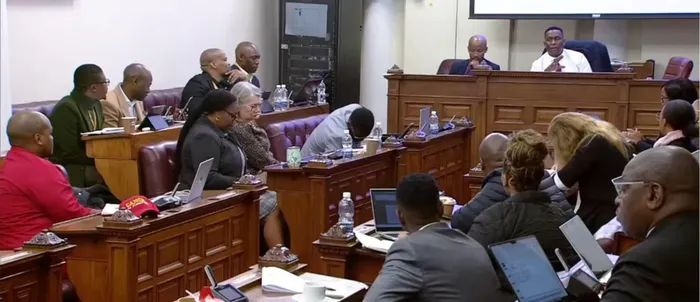Challenges facing NSFAS: higher education and training committee members voice concerns

The portfolio committee on higher education and training was briefed by the National Student Financial Aid Scheme (NSFAS) covering several key areas. These included the progress in resolving student appeals, funding decisions for the 2025 academic year, the disbursement of funds and allowances, the close-out report, student accommodation, and other relevant issues.
Image: Screenshot
Despite being interrogated about the state of the National Student Financial Aid Scheme (NSFAS) and its shortcomings, acting chief executive officer Waseem Carrim says the institution will be stable, more functional, effective and efficient in a few months.
On Wednesday, NSFAS updated the portfolio committee on higher education and training on matters plaguing the institution.
While committee members posed questions, they also expressed significant concerns regarding NSFAS.
Committee member Sihle Ngubane said: “It’s (NSFAS) in tatters; it’s disappointing, and these issues have been deliberately allowed to persist, from accommodation to tuition, transport, and the ICT system; the whole value chain is a mess.”
Another committee member, Mnqobi Msezane, said NSFAS has a high level of incompetence.
“I’m not going to delve into what you inherited and whatnot because there are many members there, including senior members such as the COO, who has been there at NSFAS and when all these things have been happening and they continue to happen. There are staff members who are responsible to be dealing with matters that are still there, that you found there,” Msezane said.
“There is serious incompetence in your space, and we want to see consequence management.”
Committee member Sedukanelo Louw said they have been sitting with the Department of Higher Education and Training and NSFAS and dealing with similar issues daily and yearly.
“Your institutional system and NSFAS must be aligned,” Louw said.
“By the end of June, you must have the SARS system implemented in NSFAS that is aligned with universities, aligned with NSFAS and private providers,” Louw continued.
“When you have aligned your systems and you fix your system in terms of documentation that you must submit to SARS and others, it will assist you to understand who you should fund and who you should not fund. That will be a solution for the students.”
Providing recommendations, Louw said unaccredited private accommodation should not be paid for however, providers should be encouraged to seek accreditation. Centralise the close-out project. Implement an action plan for the Auditor-General of South Africa’s recommendations. Develop clear, honest, transparent communication, including challenges, as this approach will foster trust, enhance collaboration and ensure that all stakeholders are well informed, even when addressing difficulties.
Carrim said: “There’s no quick fix to what we are dealing with here; it is going to take a few months for us, and I apologise for that. We did not inherit a perfect system at NSFAS.”
“We’re following a process in a very imperfect system.”
Acting CFO Luhle Tshangela said R119 million was received for the ICT system upgrade, and they have about R30 million left. The money was used to update the systems, application systems and to add to the capacity of the ICT department.
Carrim added that he empathised with what students are going through.
“At no point do we take any joy or pleasure from students not being paid. I understand that students are required to survive on meagre living allowances for the accommodation that NSFAS must provide, and that when the institution fails, this has ramifications throughout the system,” Carrim said.
“The issues are structural and systematic, it is going to take me and the team a bit of time to be able to work through them, and where there is underperformance or non-performance, there will be consequences for that, where there is wrongdoing, there will be consequences for that. We’re not going to tolerate underperformance and non-performance. We’ve made performance management a non-negotiable.
“I do ask the committee to give me a bit of time to be able to resolve. In my view, in six months, I think we will be much stable and a much more functional, effective and efficient institution,” Carrim said.
thobeka.ngema@inl.co.za
